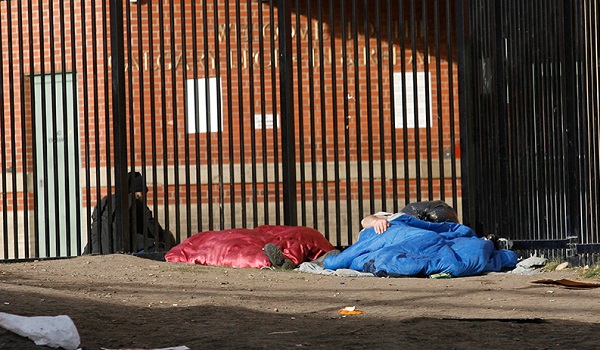Separation from families for years while under asylum in Canada and getting permanent residence not an easy task
For many refugee claimants, being granted protection in Canada can take 18 months. It can be much longer to reunite with the spouses and children they left behind.
And these family reunifications are bound to take even longer in the near future with the number of claimants — and accepted cases — surging, while an annual quota limits how many of the “protected persons” and their immediate family members abroad can transition to be permanent residents.
With the federal government freezing the permanent immigration levels this year through 2026, both the Canadian Bar Association and the Canadian Council for Refugees are demanding a public policy from Ottawa to let the overseas dependants of protected persons come on a temporary resident permit, to ease their prolonged separation.
“So at least you’re waiting in Canada for the finalization of your permanent residence,” said Gauri Sreenivasan, the refugee council’s co-executive director.
“Canada has already said your family is eligible. We just have this really slow process to wait for the paper. So we’re saying, ‘Issue them a temporary resident permit so that they can wait in Canada, surrounded by their parents and the kids can go to school.’”
Asylum seekers on the rise
The annual number of people seeking asylum in Canada has grown significantly since 2021 when international borders fully reopened after the pandemic, from 24,127 to 137,947 in 2023. In the first three months of this year, 46,693 claimants were reported.
With more cases being processed, the number of positive decisions has also grown, from 30,290 in 2021 to 37,222 in 2023. Between January and March this year, the refugee board already granted protection to 11,082 people. There are about 186,000 claims pending in the system.
Yet, the permanent residence quotas allotted each year for protected persons and families are not catching up. In 2021, there were 23,500 permanent resident spots assigned to them, but the number of people granted asylum surpassed that by 6,790. Last year, there were 25,000 spots resulting in a 12,222 shortfall. The queue just keeps growing. (Note: the number of people granted asylum includes the principal applicants and their family members in Canada only.)
According to the Immigration Department’s website, it currently takes 24 months for the principal applicant (the person granted protection status) and 50 months for their overseas dependants to obtain permanent residence in Canada. That’s on top of the average 18 months it takes the refugee board to adjudicate the applicants’ cases.
“You leave your family behind with the hope of being able to get protection and then bring them here,” said Gabriela Ramo, chair of the Canadian Bar Association’s immigration law section. “That’s not an uncommon experience.
“This is about the quota. There’s only so many spots and you’ve got a huge pool.”
The majority of people granted asylum, already vetted during that process, do ultimately become permanent residents, advocates say, and the delay in reuniting with their families creates further hardship and delays their settlement.
“You can’t fully integrate in Canada when you’re worried about your family on the other side of the world and you’re in a state of limbo,” said Ramo. “Everything in your life is suspended.”
‘I was missing them so much’
Former refugee Verene Mukabera knows that feeling well; it took her a total of four years before her husband and daughter joined her in Canada.
The Rwandan woman was seven months pregnant when she arrived alone in 2006. She had to care for her baby on her own for four years while working to support herself and her family abroad.
“I was crying all the time for no reasons. I got irritated and depressed easily,” recalled Mukabera, who needed mental health counselling. “I was missing them so much. Even after I got the protected person status, I couldn’t go see them. Money was an issue and I couldn’t go back.”
Her daughter joined her in Canada when she was nine, four years after Mukabera had left.
“I felt like a stranger to my daughter. That’s the hardest thing,” said the 50-year-old woman, who works as a personal support worker in Gatineau, Que.
Since Mukabera had already been here for several years, she was the breadwinner in the household, and the role change between her and her husband became a source of tension. “Our family relationship suffered. It took us a few years to start over as a family again.”
Pilot project launched
The Immigration Department said all permanent residence applicants must undergo medical and security clearances, and dependants are required to have their immigration history and status examined. Officials have launched a pilot to centralize and streamline the processing of dependants abroad within Canada rather than through visa posts in other countries.
“Timely adjustment of immigration status and family reunification remains one of the objectives of Canada’s asylum system,” said the department, adding that temporary resident permits are already available on a case-by-case basis.
The refugee council’s Sreenivasan said many protected persons are compelled to go before the Federal Court for orders to push immigration officials to fast-track their permanent residence applications, which bring unnecessary legal costs.
Despite the recent public pushback against the surging temporary residents arriving to work and study in Canada, Sreenivasan cautioned that the circumstances of protected persons are totally different.
“They are not like temporary foreign workers or international students, who come and then can return home,” she said. “We should not think of refugees and their families as temporary residents. To me, the whole discussion of refugees is misplaced in that category.”
This article was first reported by The Star













